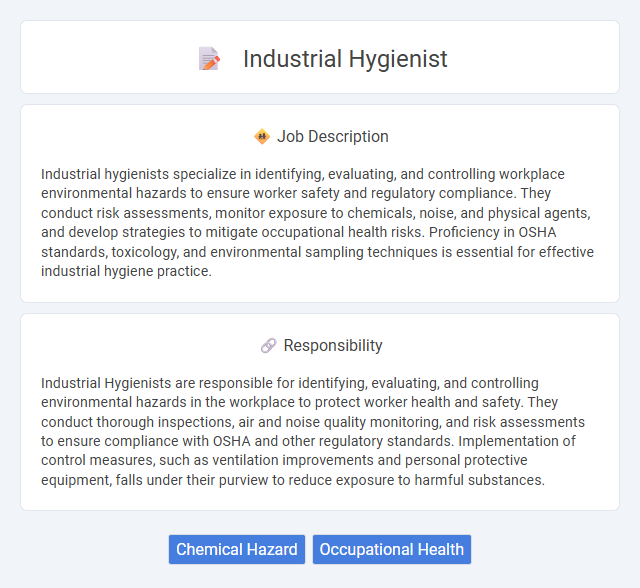
Industrial hygienists specialize in identifying, evaluating, and controlling workplace environmental hazards to ensure worker safety and regulatory compliance. They conduct risk assessments, monitor exposure to chemicals, noise, and physical agents, and develop strategies to mitigate occupational health risks. Proficiency in OSHA standards, toxicology, and environmental sampling techniques is essential for effective industrial hygiene practice.
Individuals with strong attention to detail and a passion for health and safety may be well-suited for a role as an Industrial Hygienist. Those who prefer analytical problem-solving over physical labor are likely to thrive in this profession. People comfortable working in potentially hazardous environments and committed to protecting workers' well-being probably fit the demands of this job.
Qualification
Industrial Hygienists typically hold a bachelor's degree in industrial hygiene, environmental health, occupational safety, or a related field, with many possessing certifications such as the Certified Industrial Hygienist (CIH) credential. Extensive knowledge in toxicology, chemistry, and risk assessment methods is essential for identifying workplace hazards and implementing control measures. Proficiency in regulatory compliance and experience with monitoring equipment and data analysis further enhance an Industrial Hygienist's qualifications.
Responsibility
Industrial Hygienists are responsible for identifying, evaluating, and controlling environmental hazards in the workplace to protect worker health and safety. They conduct thorough inspections, air and noise quality monitoring, and risk assessments to ensure compliance with OSHA and other regulatory standards. Implementation of control measures, such as ventilation improvements and personal protective equipment, falls under their purview to reduce exposure to harmful substances.
Benefit
Industrial hygienists likely improve workplace safety by identifying and controlling health hazards, which can reduce employee illness and absenteeism. Their expertise probably leads to compliance with regulations, minimizing legal risks and financial penalties for companies. Employers generally benefit from increased productivity and employee morale due to healthier work environments managed by industrial hygienists.
Challenge
Industrial hygienists likely encounter challenges related to identifying and controlling hazardous workplace factors that may impact employee health. Navigating complex regulations and rapidly changing safety standards probably requires continuous learning and adaptation. They may also face difficulties in effectively communicating risks and preventive measures to diverse workplace audiences.
Career Advancement
Industrial hygienists enhance workplace safety by identifying and mitigating environmental hazards, leading to increased responsibilities and leadership roles in occupational health. Mastery of regulatory compliance, risk assessment, and advanced sampling techniques paves the way for promotions to senior hygienist or safety manager positions. Continuous professional development through certifications like Certified Industrial Hygienist (CIH) significantly accelerates career growth and opportunities in diverse industries.
Key Terms
Chemical Hazard
Industrial hygienists specializing in chemical hazards assess workplace environments to identify and control exposure to toxic substances such as solvents, gases, and particulates. They implement monitoring strategies using air sampling and chemical analysis to ensure compliance with OSHA, NIOSH, and EPA regulations. Risk mitigation involves designing ventilation systems, recommending personal protective equipment, and developing safety protocols to prevent occupational illnesses.
Occupational Health
Industrial hygienists specialize in identifying and controlling workplace hazards to protect employee health and safety. Their expertise in occupational health involves evaluating exposure to chemicals, noise, and biological agents, implementing preventive measures, and ensuring compliance with regulatory standards. By conducting risk assessments and developing safety programs, they minimize occupational illnesses and promote a healthy work environment.
 kuljobs.com
kuljobs.com